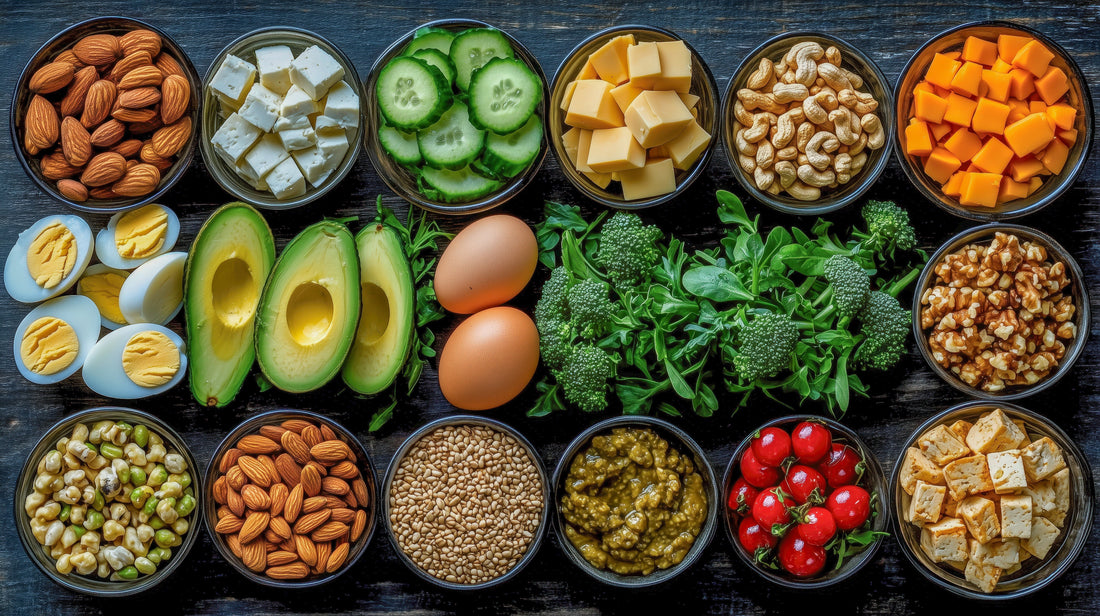Contents:
- Ketogenic diet – what is it?
- What rules apply to the ketogenic diet
- How do you start your ketogenic diet adventure?
- Ketogenic diet – what should you eat?
- Are there any contraindications to the ketogenic diet?
- What effects can you expect from the keto diet?
The ketogenic diet is becoming increasingly popular. Many people use it to improve their health and to treat and prevent obesity, diabetes, certain cancers, and neurodegenerative diseases. Although the ketogenic diet is said to offer health benefits, its restrictive nature can lead to serious side effects in some cases, especially with long-term use. Let's take a closer look at this diet and learn more about its pros and cons.
Ketogenic diet – what is it?
The ketogenic diet puts the body into a state of ketosis, where fats, rather than glucose, become the primary energy source. This process produces ketone bodies such as acetone, beta-hydroxybutyrate, or acetoacetic acid. These are used as an alternative energy source, replacing conventional glucose. The goal of the diet is to alter your metabolism so that your body begins to derive energy primarily from fats.
What are the rules for the ketogenic diet?
The ketogenic diet relies primarily on fat, moderate amounts of protein, and minimal amounts of carbohydrates. A typical macronutrient breakdown would be approximately 75–90% fat, 5–15% protein, and 5–10% carbohydrates. For example, in a 2000 kcal per day diet, carbohydrates do not exceed 20–50 g. There are several variations of this diet, with varying macronutrient ratios, but fat always remains a priority. However, it's important to remember that the keto diet isn't just about restricting carbohydrates—protein intake must also be moderate. Too much protein can be converted to glucose, disrupting the ketosis process.
How do you start your ketogenic diet adventure?
A ketogenic diet requires careful carbohydrate management. The daily intake should be just 20–30 g. It's important to know which foods contain carbohydrates and which provide fats and proteins. Carbohydrates are found not only in bread and sugar, but also in legumes such as beans. Fruits and vegetables also contain these compounds. Meat and oils, on the other hand, are sources of protein and fat, but do not contain carbohydrates.
When preparing for the keto diet, it's worth improving your cooking skills. Fast food and convenience foods are not conducive to maintaining ketosis.
The ketogenic diet is not intended for long-term use. Treatment should be repeated regularly, for example, for a few weeks every six months. Before committing to it, we should plan time to avoid strenuous physical activity, which could make it difficult for the body to adapt.
Ketogenic diet – what should you eat?
The ketogenic diet is based on a significant restriction of carbohydrates. To achieve ketosis, you only need to consume fewer than 50 grams of carbohydrates per day, with the optimal amount being around 20 grams.
When following the keto diet, it is worth paying attention to the following:
- Meat – Fresh, unprocessed meat contains no carbohydrates and is a source of high-quality protein. Depending on the cut of meat, it can also provide a lot of fat, which helps maintain ketosis and supports muscle mass.
- Eggs – One egg contains less than 1 gram of carbohydrates, about 6 grams of protein, and 5 grams of fat. Eggs provide a feeling of satiety. It's best to eat them whole, as the yolk contains important nutrients such as fats and lutein.
- Vegetable oils – On the ketogenic diet, it's best to choose vegetable oils rich in monounsaturated and polyunsaturated fats. These are healthy fats that help reduce the risk of heart disease and support the process of ketosis. Nuts, seeds, and avocados are also good choices.
- Milk and dairy products – Products like full-fat cheese, cream, and yogurt are a great source of fat, a moderate amount of protein, and a small amount of carbohydrates. Cheeses like goat cheese, sheep cheese, cheddar, mozzarella, feta, Parmesan, Gouda, or Edam are also worth considering.
- Vegetables – It's recommended to eat raw vegetables, especially leafy greens like spinach, kale, cabbage, or lamb's lettuce. They're low in carbohydrates and rich in fiber, vitamins, and minerals. Fiber is important for avoiding intestinal problems on the keto diet.
In the ketogenic diet, it is crucial to properly balance macronutrients, especially fats, proteins and carbohydrates.
Are there any contraindications to the ketogenic diet?
The ketogenic diet isn't suitable for everyone, and its use has some contraindications. People who should avoid this diet include:
- Patients with kidney disease,
- People with metabolic problems such as diabetes (although the keto diet can help control blood sugar levels in some cases),
- People with high physical activity, especially in endurance disciplines,
- People suffering from malnutrition, vitamin, mineral or protein deficiencies.
The keto diet can cause some side effects even in healthy people:
- so-called “keto flu” – manifests itself through nausea, headaches, fatigue, difficulty exercising and constipation,
- An unbalanced diet can lead to nutrient deficiencies, such as vitamin B12, vitamin D , omega-3, iron, calcium, or zinc. These deficiencies can lead to fatigue, skin rashes, constipation, loss of appetite, difficulty concentrating, or mood swings. Long-term vitamin B12 deficiency can lead to anemia, and vitamin D deficiency increases the risk of osteoporosis, depression, and insulin resistance.
- Excess fat in a keto diet with low protein intake can lead to muscle loss as the body begins to burn protein to maintain vital functions. This, in turn, can impair metabolism and slow its function.
- Due to the increased excretion of water and electrolytes via the kidneys, an adequate mineral intake is important to prevent deficiency symptoms.
If you are embarking on a ketogenic diet, it is worth knowing the risks and adapting it to your needs.
What effects can you expect from the keto diet?
The ketogenic diet can be helpful for weight loss if approached wisely. High amounts of fat and protein in the diet make people who follow it feel more full. Compared to other diets, feelings of hunger are significantly reduced. However, research shows that the keto diet alone does not guarantee more effective weight loss. The key to losing weight is simply consuming fewer calories than your body needs, regardless of the type of diet—whether low-carb or high-fat.
At the beginning of a ketogenic diet, rapid weight loss may occur, primarily due to the loss of glycogen (stored sugar) and water. While initial weight loss may be noticeable, this does not mean the keto diet is more effective for long-term weight loss than other methods.
THE PUBLISHER'S CHOICE
Dried dates 1 kg BIOGO
- €4,21
€4,95- €4,21
- Unit price
- / per
Peeled sunflower seeds 1 kg BIOGO
- €3,04
€3,57- €3,04
- Unit price
- / per
Dried organic mango 400 g BIOGO
- €10,99
- €10,99
- Unit price
- / per
Dried White Mulberries 500 g ORGANIC
- €5,84
€6,87- €5,84
- Unit price
- / per
Organic Ground Turmeric 500 g BIOGO
- €5,92
- €5,92
- Unit price
- / per
Oat flakes 800 g BIOGO
- €2,34
€2,76- €2,34
- Unit price
- / per
Milk thistle seeds 1 kg BIOGO
- €3,99
- €3,99
- Unit price
- / per
Popcorn (corn kernels) organic 1 kg BIOGO
- €5,84
- €5,84
- Unit price
- / per
Organic cashew nuts 1 kg BIOGO
- €19,99
- €19,99
- Unit price
- / per
Unpeeled buckwheat groats 1 kg BIOGO
- €2,81
€3,31- €2,81
- Unit price
- / per







































































































































